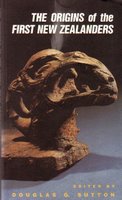Q: How did Maori activists [he asks] attain the apparent status they now possess in the environmental movement? In other words, why do NZ environmentalists bow to Maori prejudices? When I wrote my thesis this absurdity was not evident as it is now. Please can anybody shed some light on this?So here's my rather belated answer.
 On the facts of pre-European Maori environmental stewardship , the best I've read is a shortish piece by M.S. McGlone et al: 'An Ecological Approach to the Polynesian Settlement of New Zealand' published in The Origins of the First New Zealanders [Auckland University Press, 1994.] Unfortunately, it's not online (although I do quote from it briefly in this article), but it does rather give the lie to the idea of Maori as sound environmental stewards.
On the facts of pre-European Maori environmental stewardship , the best I've read is a shortish piece by M.S. McGlone et al: 'An Ecological Approach to the Polynesian Settlement of New Zealand' published in The Origins of the First New Zealanders [Auckland University Press, 1994.] Unfortunately, it's not online (although I do quote from it briefly in this article), but it does rather give the lie to the idea of Maori as sound environmental stewards.Take bird life for example.
"James et al estimate that untouched Oceania may have had more than 9000 bird species -- more than the total of surviving species on Earth today. Most of this incredibly rich fauna was eliminated by the direct or indirect effect of [pre-European] settlement... The amount of accessible fat and protein per square kilometre on a Pacific island may have been unequalled anywhere in the world...
Direct evidence exists for this superabundance of bird and marine resources on unexploited islands... In the initial settlement period [of New Zealand], the early abundance of bird bone must have represented a truly incredible exploitation rate... [Yet] NZ midden evidence shows that the consistent exploitation of birds in the late prehisoric results in few bird-bone remains...
The extinction of birds other than moa and of reptiles, and the shrinking of the range of many other species are well-attested (Cassels 1984)... the absence of these species in natural deposits such as caves, swamps and sand dunes after about 1,000 years ago strongly suggests early and vigorous depletion...
 In summary: the birds were being killed and eaten in great numbers, in complete disregard it seems of any long-term consequences.
In summary: the birds were being killed and eaten in great numbers, in complete disregard it seems of any long-term consequences.The case is the same for New Zealand flora. Slash and burn agriculture "rapidly destroyed much of the forest cover... By 600 years [Before Present] many animals had been driven to extinction or close to it, and very large areas of country, even in remote inland South Island valleys, were being burnt regularly... A degree of burning may been beneficial, for a [short] time at least."
 However, over the longer term: "Extensive burning of inland valleys and ridges offered no obvious advantages in terms of food production..." The result of indigenous environmental stewardship over the longer term? Population grew rapidly in the North Island of NZ from 800 years BP, before slowing down about 400 years BP (following the major forest clearance phase) and plateauing about 200 years BP at about 100,000 when resources began diminishing (see graph at right).
However, over the longer term: "Extensive burning of inland valleys and ridges offered no obvious advantages in terms of food production..." The result of indigenous environmental stewardship over the longer term? Population grew rapidly in the North Island of NZ from 800 years BP, before slowing down about 400 years BP (following the major forest clearance phase) and plateauing about 200 years BP at about 100,000 when resources began diminishing (see graph at right).After the initial settlement phase, New Zealand moved directly into a subsistence mode which characterised other island populations only during famine or when pushed into highly marginal lands... By the end of the prehistoric period New Zealand was no longer resource-rich, and the very scarcity of resources and reliance on hard-won wild foods had created a situation from which no larger political entities could easily arise.So the idea of Maori as sound environmental stewards is not supported by the archaeological evidence. As 'sustainable' environmentalists they just weren't. So how to explain then the apparent status they now possess in the environmental movement? The reason is more widespread than is contained in environmentalism alone.
I think there's perhaps three legs in answer to the question, all related.
1. The Noble Savage
 The first is the notion, first given currency by Rousseau, of the 'Noble Savage' -- the romantic idea of wild, untamed human creatures 'uncorrupted' by civilisation. It might be noted that this creation of 'romantic primitivism' was postulated entirely without evidence.
The first is the notion, first given currency by Rousseau, of the 'Noble Savage' -- the romantic idea of wild, untamed human creatures 'uncorrupted' by civilisation. It might be noted that this creation of 'romantic primitivism' was postulated entirely without evidence.As Roger Sandall amongst others has noted, "A 'savage,'' untouched by civilization, would be akin to an animal, and neither noble nor a good role model for a society. By viewing civilization as something that corrupts or taints a person's pure or natural state, 'new tribalists' are succumbing, like Rousseau, to the romantic idea that the natural state of a human being, without the moderating effect of civilization, is somehow better. To the critics this notion is easily refutable, either by comparing human quality of life before civilization, or as humorist P.J. O'Rourke pointed out, by considering the natural state of children."
In Sandall's view, [summarises Wikipedia] romantic primitivism places far too high a value on cultures that were often characterised by, among other aspects, limited human rights, religious intolerance, disease and poverty. Other negative aspects he discusses include domestic oppression (usually of women and children), violence, clan/tribal warfare, poor care of the environment and considerable restriction on artistic freedom of expression.'The Four Stages of Noble Savagery: The Moral Transiguration of the Tribal World' is the Appendix to Sandall's book, 'The Culture Cult,' and is highly readable on this question. He concludes by discussing the 'Disneyfication' of the 'Noble Savage':
Sentimentalism begets puerility. The ruthless scalpers of yesterday become Loving Persons. One-time ferocious fighters are discovered to be Artists at Heart. Hollywood becomes interested...
Combined with this a suffocating religiosity now descends on public discussion, enforced by priests and judges, journalists and teachers, poets and politicians, all of whom claim that native culture possesses a “spirituality” found nowhere else. Soon the primitive is elevated above the civilized. In the words of one observer in New Zealand it is said that the whites “have lost the appreciation for magic and the capacity for wonder” while white culture, besides being “out of step with nature. . . pollutes the environment and lacks a close tie with the land.”
Few are unkind enough to note that “the imagined ancestors with whom the Pacific is being repopulated”—Wise Ecologists, Mystical Sages, and Pacifist Saints—“are in many ways creations of Western imagination.”
Just like Pocohantas. Or Chief Seattle.
2. 'The National Question'
The second leg is specifically political, the idea that Lenin called 'The National Question' -- a specific strategy adopted by Marxist-Leninists to help destabilise a colonised country by use of the grievances, real or otherwise, of indigenous populations.
This movement came to attention in NZ in the late seventies (made most visible with the 'Treaty is a Fraud' movement), and you might say that reached its apogee under Neville Bolger's appeasing stewardship (when it suddenly transmogrified into an'Honour the Treaty' movement).
When mainstream Marxism collapsed following the collapse of the Berlin Wall -- and with it any claim that Marxist societies would ever be able to produce (or be good environmental stewards) -- rather than give up their authoritarianism, the custodians of 'The National Question' stampeded into local and overseas environmental movements, as I'm sure Trevor Loudon will attest. Consequently, the numbers of 'National Question' adherents and other fellow-travelers (the gullible type whom Lenin called Useful Idiots) who call themselves 'green' but are still red on the inside would seem to be quite large.
3. Multiculturalism
The third leg, related to and in some sense underpinning both, is the notion of 'multiculturalism' -- the idea that all cultures are equal (apart, that is, from the cultures of the west). 'Multi-culti is one of the many foolish notions of postmodernism, (encompassing both moral relativism and political correctness) that captured the academies in recent years.
Naturally when the least are made equal to the best, the least win out. If all cultures are asserted (without evidence) to be equal, then one is disarmed from finding evidence that would disprove such an assertion. To find and assert such evidence would, according to the multiculturalist, be 'racist.'
The consequence is this: If one is disarmed from judging a culture -- which is one of the goals of moral relativism -- then the worst cultures are left free from moral judgement, and moral judgement itself becomes bereft of any evidential-base: the only immorality to a multiculturalist is to challenge the assertions of multiculturalism. That too would be racist.
 But as Thomas Sowell points out, you can judge cultures, and in fact if human life is our standard then morality demands that we should judge them.
But as Thomas Sowell points out, you can judge cultures, and in fact if human life is our standard then morality demands that we should judge them.
Cultures [he insists] are not museum-pieces. They are the working machinery of everyday life. Unlike objects of aesthetic contemplation, working machinery is judged by how well it works, compared to the alternatives. The judgment that matters is not the judgment of observers and theorists, but the judgment implicit in millions of individual decisions to retain or abandon particular cultural practices, decisions made by those who personally benefit or who personally pay the price of inefficiency and obsolescence."
Anyway, on this last point you might want to have a good look at:
- My own Multiculturalism archives.
- Thomas Sowell's book 'Conquest and Cultures.'
- George Reisman's superb pamphlet 'Education and the Racist Road to Barbarism,' which pretty much explains and explodes the process and the arguments behind multiculturalism.
- 'Multiculturalism: The New Racism,' a special issue of the Ayn Rand Institute's 'Impact' magazine.'
- And for a background to how they get away with it philosophically, you might take a good look also at Stephen Hicks's superb book 'Explaining Postmodernism' - you can read a summary of the book's thesis here in an interview with Hicks.
REFERENCES CITED ABOVE IN McGLONE et al:
- Cassells, R., 1984: 'The role of prehistoric man in the faunal extinctions of New Zealand and other Pacific Islands,' in Martin et al Quaternary Extinctions, Uni of Arizona Press.
- James et al, 1987: 'Radiocarbon dates on bones of extinct birds from Hawaii,' Proceedings of the Nat. Academy of Sciences of the USA, 84.
- Leach, H.M., 1980: 'Incompatible land use patterns in Maori food production,' New Zealand Archaeological Ass. Newsletter, v.23.
- The four stages of Noble Savagery: The moral transiguration of the tribal world- Roger Sandall's 'Culture Cult' website
- 'The Culture Cult' book - Roger Sandall's 'Culture Cult' website
- 'Conquest and Cultures' - book by Thomas Sowell, Amazon.Com
- Multiculturalism - 'Not PC' (Peter Cresswell)
- Education and the racist road to barbarism - pamphlet available for download and purchase at George Reisman's site
- Multiculturalism: The new racism - Special Issue of the Ayn Rand Institute newsletter
- Explaining Postmodernism - book by Stephen Hicks, publishers website
- Stephen Hicks on postmodernism - interview at TOC website
RELATED: Environmentalism, Racism, Multiculturalism, Postmodernism, Political Correctness, Politics, Conservation, Maoritanga, Philosophy
3 comments:
I think the case is pretty clear that Maori were unsustainable in their farming and hunting methods used from the time they settled. The question is: did they learn from their mistakes in more recent pre-European times? Did Maori realise that they had destroyed their food source with previous plundering and came up with a sustainable approach to their use of resources?
I don't know the answer to these questions, however, without private property rights I suspect the answer is no on both counts.
I don't think it is correct to say that Bolger "appeased" Maori radicals, if anything by addressing legitimate Maori grievances against the government (which in my view were within the ambit of the common law). If anything the settlement process set the radicals back, simply because the desire for Maori "independence" becomes counterproductive to making Maori (like Ngai Tahu or Tainui) better off.
Moreover, I don't think Chamberlain's appeasement was so bad. While he did give Hitler Czechoslovakia, he ensured that Britain got the Spitfire into production and had its radar systems in placed, and from 1935 presided over the massive re-armament of Britain. The man who promised "peace in our time" also ensured that Britain came through in its finest hour.
Lewis, you make some sweeping statements.
Legitimate tribal grievances should have the right to be heard in a regular court of law, not the Waitangi Tribunal, which is a kangaroo court. Secondly, I wonder at the 'full & final' bit of the pay-outs. I understand that either Tainui or Ngai Tahu (sorry, can't remember which and can't lay my hands on the book) have now received 4 over the last century, the third being some 300,000 pounds (during wartime to boot) via Peter Fraser and called 'full & final'. Which means I won't be at all surprised if the likes of Syd Jackson's great-grandkids have another go in 50 yrs time 'for being rorted in the mid-90's'.
And as for Neville Chamberlain, oy vey. After having his head in the sand with regard to Hitler's activities, he finally got his bum into gear when his own was on the line. 'Massive re-arming'? Sebastian Faulks has written that British aircraft got down to dangerously low figures during the Battle of Britain, despite the prowess of the Allied aviators.
Goering decided that his information was wrong and changed tack at was what pretty much the eleventh hour for Britain, buying Churchill some time.
Spkg of Churchill, he defined an appeaser as such: Someone who feeds a crocodile hoping it will eat him last.
Food for thought, eh.
Post a Comment